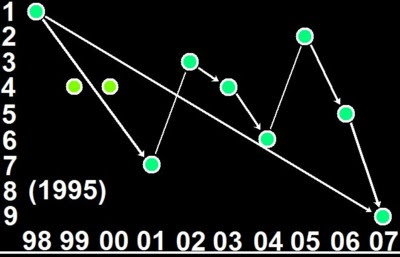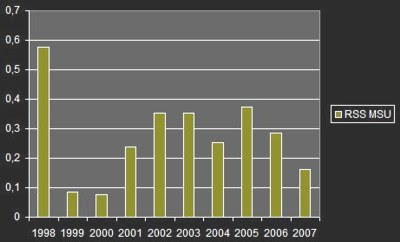Friday, January 04, 2008 ...
 /
/
 /
/
 /
/
 /
/
 /
/

2007 warmest year on record? Coldest in this century
One month ago, we noticed that November 2007 was the coldest month since January 2000. Well, the RSS MSU satellite data show that December was even cooler. The December anomaly was -0.046 °C, compared to -0.014 °C in November. That means that December 2007 was also cooler than the average December from 1979. Moreover, we can finally complete the ranking of years!
Let me start with forecasts in the mainstream media.
In January 2007, we were informed that 2007 was either likely or certain to surpass 1998 and become the world's warmest year on record by most media, including:
In the middle of the year when it started to be clear that the prediction was bogus, Phil Jones (Reuters) changed his mind only infinitesimally. It would be the second hottest year, he said. These big-shot pseudoscientists never have the courage to say that they were wrong.
Reality: thermometers
However, the greenhouse gases are not too important and El Nino was replaced by La Nina. As a consequence, RSS MSU data for the lower troposphere (graph, more graphs) show that 2007 was the coldest year in this century so far. In alarmist jargon, it was the ninth hottest year on record: the most recent year was cooler than all other years in this century as well as 1998 (by a whopping 0.41 °C) and even 1995. According to different datasets (HadCRUT3, UAH MSU, NOAA), the year is going to be approximately the 8th (HadCRUT3) or 7th (NOAA) or 6th warmest year. UAH might report 2007 as the 4th warmest year and GISS will be a real exception because 2007 will be almost certainly its 2nd warmest year (as James Hansen said a few weeks ago, after 2005 but slightly above 1998) - but it is still very far from the hype about the hottest year. Your humble correspondent is not the only one who believes that the satellite measurements such as RSS, UAH are more accurate than GISS, HadCRUT3. It just happens that HadCRUT3 is closer to RSS than UAH to RSS, as far as the recent rankings go.
The RSS MSU linear trend extracted from the 1998-2007 interval is -0.48 °C per century of cooling! Numerically, it's almost the same trend that we assign to the 20th century but with the opposite sign! Other teams will generate qualitatively compatible results but substantially different numbers, raising doubts about the reliability of the temperature measurement even in the modern era.

Figure 1: Global cooling. Nine hottest years on record as shown by the RSS MSU calculations, from the hottest year 1998 to the coolest year 2007.
Let me emphasize that if someone thinks that the "ninth hottest year" is still hot, it is of course an irrational reaction. The global mean temperature is a continuous function of time and is auto-correlated. It follows that a short time after what has been identified as the hottest instrumentally measured years, we can't abruptly return to years as cool as 1850 or 1660. The laws of mathematics just make such a possibility extremely unlikely.
Ramifications
Do you expect the media listed above to apologize for the misinformation they have printed? Do you think they will tell their readers and audiences that they have made a mistake and reported scientifically unreliable and unlikely propaganda created by political activists and hacks such as Phil Jones? Do you think that they will promise us that they will be more careful in the future and avoid this kind of hype? If you do, you haven't understood what religious bigotry and special interests really mean. Most of these people are either lunatics who pay no attention whatsoever to reality, the actual data, or serious science, or corrupt people who greatly benefit from this big-scale misinformation and propaganda.

Figure 2: RSS MSU temperature anomaly for the lower troposphere (the layer near surface, description) in deg C, 1998-2007.
Here is the Google Docs spreadsheet with the complete 1998-2007 monthly data of RSS MSU and nearly complete data from four other teams (HadCRUT3, UAH MSU, GISS, NCDC NOAA) that will release their December data in a few days or weeks. You may also download the Excel file. The World Meteorological Organization publishes their data as an average of HadCRUT3 and NOAA: you can do the math to predict their results, too: for WMO, the year will be either 7th or 8th warmest year.
Phil Jones et al. now forecast 2008 to be even cooler than 2007 (sanely, due to La Nina that will strongly affect at least the 4 following months) but they present this prediction as perfectly compatible with "underlying global warming".
 /
/
 /
/
 /
/
 /
/
 /
/

2007 warmest year on record? Coldest in this century
One month ago, we noticed that November 2007 was the coldest month since January 2000. Well, the RSS MSU satellite data show that December was even cooler. The December anomaly was -0.046 °C, compared to -0.014 °C in November. That means that December 2007 was also cooler than the average December from 1979. Moreover, we can finally complete the ranking of years!
Let me start with forecasts in the mainstream media.
In January 2007, we were informed that 2007 was either likely or certain to surpass 1998 and become the world's warmest year on record by most media, including:
Reuters
AP & Foxnews
IHT
BBC
MSNBC
CBS
USA Today
The New York Times
The New York Sun
The Washington Post
National Geographic
CBC
The Guardian
The Independent
China People Daily
ABC Australia
Discovery Channel
Science Daily
Met Office
as well as virtually all other media you know. They justified this statement by referring to scientists who have combined greenhouse gases with the observed El Nino. Many sources, such as the New York Sun, even gave you the probability that 2007 would be the hottest year as 60 percent. They immediately added that this should "add momentum for the next phase of the Kyoto protocol".AP & Foxnews
IHT
BBC
MSNBC
CBS
USA Today
The New York Times
The New York Sun
The Washington Post
National Geographic
CBC
The Guardian
The Independent
China People Daily
ABC Australia
Discovery Channel
Science Daily
Met Office
In the middle of the year when it started to be clear that the prediction was bogus, Phil Jones (Reuters) changed his mind only infinitesimally. It would be the second hottest year, he said. These big-shot pseudoscientists never have the courage to say that they were wrong.
Reality: thermometers
However, the greenhouse gases are not too important and El Nino was replaced by La Nina. As a consequence, RSS MSU data for the lower troposphere (graph, more graphs) show that 2007 was the coldest year in this century so far. In alarmist jargon, it was the ninth hottest year on record: the most recent year was cooler than all other years in this century as well as 1998 (by a whopping 0.41 °C) and even 1995. According to different datasets (HadCRUT3, UAH MSU, NOAA), the year is going to be approximately the 8th (HadCRUT3) or 7th (NOAA) or 6th warmest year. UAH might report 2007 as the 4th warmest year and GISS will be a real exception because 2007 will be almost certainly its 2nd warmest year (as James Hansen said a few weeks ago, after 2005 but slightly above 1998) - but it is still very far from the hype about the hottest year. Your humble correspondent is not the only one who believes that the satellite measurements such as RSS, UAH are more accurate than GISS, HadCRUT3. It just happens that HadCRUT3 is closer to RSS than UAH to RSS, as far as the recent rankings go.
The RSS MSU linear trend extracted from the 1998-2007 interval is -0.48 °C per century of cooling! Numerically, it's almost the same trend that we assign to the 20th century but with the opposite sign! Other teams will generate qualitatively compatible results but substantially different numbers, raising doubts about the reliability of the temperature measurement even in the modern era.
Figure 1: Global cooling. Nine hottest years on record as shown by the RSS MSU calculations, from the hottest year 1998 to the coolest year 2007.
Let me emphasize that if someone thinks that the "ninth hottest year" is still hot, it is of course an irrational reaction. The global mean temperature is a continuous function of time and is auto-correlated. It follows that a short time after what has been identified as the hottest instrumentally measured years, we can't abruptly return to years as cool as 1850 or 1660. The laws of mathematics just make such a possibility extremely unlikely.
Ramifications
Do you expect the media listed above to apologize for the misinformation they have printed? Do you think they will tell their readers and audiences that they have made a mistake and reported scientifically unreliable and unlikely propaganda created by political activists and hacks such as Phil Jones? Do you think that they will promise us that they will be more careful in the future and avoid this kind of hype? If you do, you haven't understood what religious bigotry and special interests really mean. Most of these people are either lunatics who pay no attention whatsoever to reality, the actual data, or serious science, or corrupt people who greatly benefit from this big-scale misinformation and propaganda.
Figure 2: RSS MSU temperature anomaly for the lower troposphere (the layer near surface, description) in deg C, 1998-2007.
Here is the Google Docs spreadsheet with the complete 1998-2007 monthly data of RSS MSU and nearly complete data from four other teams (HadCRUT3, UAH MSU, GISS, NCDC NOAA) that will release their December data in a few days or weeks. You may also download the Excel file. The World Meteorological Organization publishes their data as an average of HadCRUT3 and NOAA: you can do the math to predict their results, too: for WMO, the year will be either 7th or 8th warmest year.
Phil Jones et al. now forecast 2008 to be even cooler than 2007 (sanely, due to La Nina that will strongly affect at least the 4 following months) but they present this prediction as perfectly compatible with "underlying global warming".
